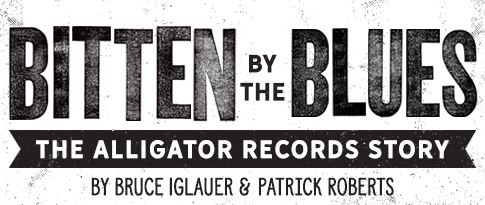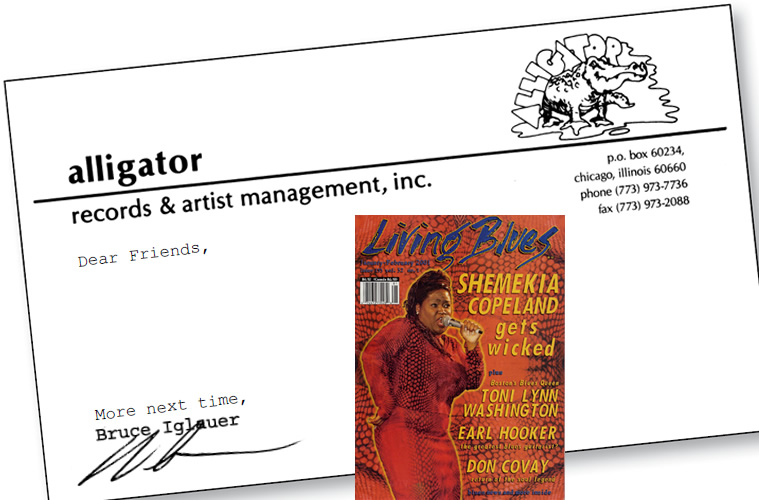Dear Friends,
I’m writing this as I fly home from Memphis; we just finished the mixes for Michael Burks’ debut album (not yet entitled) at Ardent Studios. We’re scheduling it for a March, 2001 release. If you’ve seen Michael live, you know that he’s a powerhouse guitarist and singer with an attack like Freddie King’s and a big, burly blues voice. He’s a third generation Arkansas bluesman (his dad played with Sonny Boy Williamson II) whose music has a contemporary rock edge but is still deeply rooted in the tradition. I co-produced with Jim Gaines, and it was a thrill and an education for me to work with one of the masters. Jim’s career goes back to Stax Records in the ‘60s, and some of the vibe we captured in the studio reminded me of Albert King’s Stax sides with Booker T and the MGs. We even used Booker T’s original studio organ! Michael was on fire, and you can hear it in every track.
Since I last wrote, I’ve been lucky enough to be given the rights to a truly extraordinary album. Most of you know The Holmes Brothers from their soul-stirring albums on Rounder, Real World and Stony Plain, combining blues and R&B tunes with three-part gospel harmonies. Last year, they went into the studio with their friend Joan Osborne, New York’s blues-rock diva, producing. Trina Shoemaker, the award-winning engineer of Sheryl Crow’s “Globe Sessions” album, was at the controls. The wonderful result is Speaking In Tongues. I wouldn’t call this a gospel album in the strictest sense, but it’s definitely a spiritual album, and an album of great honesty and intensity. To hear the voices of Sherman and Wendell Holmes and Popsy Dixon dig into songs by Ben Harper, Bob Dylan and Gamble & Huff, as well as four originals and a handful of traditional gospel tunes, is a pretty spine-tingling experience. Three rich female background vocals (including Joan’s) add to the excitement, and the production, which ranges from acoustic guitar and a cappella voices to very cool drum loops and samples, sets this album apart from everything The Holmes Brothers have done in the past. Alligator doesn’t normally release purely religious material, but when a non-religious guy like me can be so intensely moved by such spiritual music (and when a guy who usually likes pretty traditional blues sounds can be excited by up-to-the-moment production), I feel proud to put the Alligator logo on this album and share some great music with you. Speaking In Tongues will be out at the end of January, along with our Johnny Winter and Roy Buchanan Deluxe Editions.
I promised last time to tell you about James Cotton’s coming to Alligator in 1984. Of course I had known James and his music for years, first as a sideman with Muddy and later for his kickass albums on Verve and Buddah and for his fabulously energized live shows. He had even come to my little college in 1966; I remember him in a robin’s-egg blue suit turning somersaults across the stage while blowing some paint-peeling harp. James was one of the first bluesmen to successfully reach out to the rock audience, and his touring schedule was jam-packed. Even though he was living in Chicago, by the late ‘60s he rarely played there. I saw him a few times at Pepper’s Lounge, blowing up a storm and accompanied by some of the best players in the city; Cotton always had a great band.
By the mid-’80s, that band was built around Michael Coleman’s fiery, up-to-the-minute lead guitar, Noel Neal’s funky bass and Ray “Killer” Allison’s machine gun drumming. I had been watching Ray since he was a kid hanging out at Pepper’s, when he was so wild that no one wanted him to sit in. But a stint in Muddy’s band in the ‘70s had settled him down a lot, and Cotton’s group was one of the tightest, most disciplined modern blues bands. The band also included Eddie Harsch on keyboards (now with The Black Crowes!) and a hot little horn section. But when James and I started talking about cutting him, James wanted not only to showcase his road band, but also turn back the clock for some ‘50s style Chicago sounds. And I was glad to help.
More next time,
Bruce Iglauer

